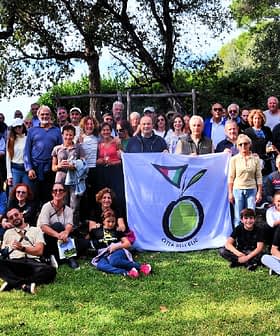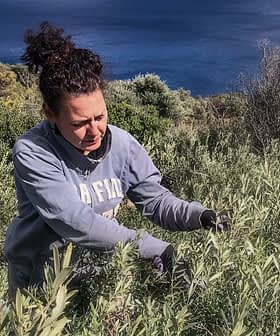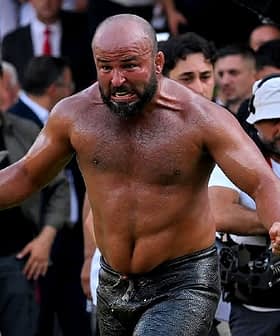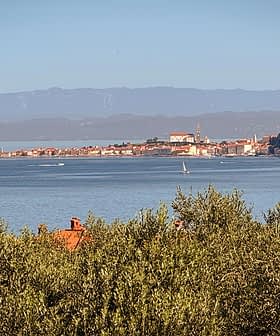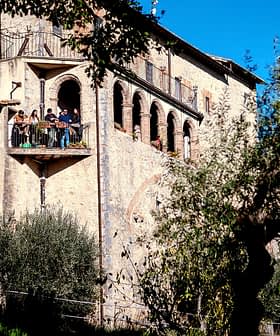Yusuf Can Zeybek Repeats Kırkpınar Triumph
The 30-year-old defeated 2022’s de facto champion Mustafa Taş in a cautious but exciting final that went into overtime.
 Yusuf Can Zeybek (via Radyospor on X)
Yusuf Can Zeybek (via Radyospor on X) Yusuf Can Zeybek won his second consecutive başpehlivan title at the Kırkpınar olive oil wrestling festival by defeating Mustafa Taş in a 52-minute match. Zeybek received the prestigious golden belt and prize money, with the opportunity to retain the title for a third year in 2025 and join the ranks of Kırkpınar immortality.
Yusuf Can Zeybek has defeated Mustafa Taş to claim his second consecutive title of başpehlivan, chief wrestler, at the 663rd edition of Turkey’s historic Kırkpınar olive oil wrestling festival.
The 30-year-old Antalya native defeated the 2022 champion (while Taş lost the fight, he was later awarded the title after Cengizhan Şimşek received a retroactive point penalty) in a vigorous round that lasted 52 minutes.
According to local media, both fighters got off to a “lively” start, with Can Zeybek coming close to taking Taş down with an early lunge. After this, the fight slowed, and Taş received a warning for being overly passive.
See Also:Traditional Turkish Olive Cultivation Practices Recognized by UNESCOThe match finished after regulation time with Can Zeybek catching the hoop on Taş’s kıspet – the short, leather pants worn by the wrestlers – causing him to lose his balance and topple to the ground.
In addition to claiming the başpehlivan title, Can Zeybek received the prestigious golden belt and 550,000 Turkish lira (€15,500) in prize money. Taş received 270,000 Turkish lira (€7,780).
On his way to the final, the two-time champion defeated Mustafa Arslan in the quarterfinal match before triumphing over Hüseyin Gümüşalan, a 2023 semifinalist, in this year’s semifinals.
In his quarterfinal clash, Gümüşalan defeated four-time champion Ali Gürbüz, which pundits said was the most exciting of the round.
The two wrestlers, considered favorites to win the tournament, spent most of the regulation time making conservative efforts to knock the other over but not creating any opening for the other.
In the 52nd minute, Gümüşalan found an opening, getting a grip on his opponent’s kıspet and knocking Gürbüz flat on his back.
Meanwhile, Taş triumphed over Enes Doğan in the quarterfinals before defeating Serhat Gökmen in his semifinal bout.
While Can Zeybek was not bothered, this year’s Kırkpınar was controversial after the Turkish Wrestling Federation announced a contentious format change.
The change created a league-style qualifying format for the tournament’s final rounds, which Turkey’s governing body of wrestling said was needed to fit the steadily increasing participation in the event — a record-high 3,500 wrestlers participated in 2023 — into a single weekend.
See Also:Listing of Kirkpinar WinnersBoth Can Zeybek and Taş qualified directly for the final stage of the 663rd Kırkpınar after finishing among the top 32 wrestlers in the league points table.
Can Zeybek now has the opportunity to join the ranks of Kırkpınar immortality in 2025 if he retains the title for a third straight year. While each başpehlivan is entitled to the golden belt until the following Kırkpınar begins, wrestlers who win three titles in a row keep the belt permanently.
Only four fighters have achieved the feat since 1960, when the golden belt was first awarded. The last time Kırkpınar celebrated a three-time consecutive champion came in 1997.
Since then, Recep Kara (2007 and 2008) and Mehmet Yeşil Yeşil (2009 and 2010) have come the closest, but each failed to win for the third time. Incidentally, Kara defeated Yeşil Yeşil to become the 2016 champion.
Kırkpınar is widely considered to be the world’s longest-running sporting event. In 2010, it was added to the UNESCO’s Intangible Cultural Heritage of Humanity list.
According to legend, the wrestling competition began in 1357 when a group of Ottoman soldiers stopped near Edirne.
As they waited near the former capital of the Ottoman Empire, 40 soldiers began wrestling to pass the time. After the rest had finished, the final two continued their bout into the night, and both were found dead the following day.
There was no winner that year, but since then, the event has been held each July, except for 2020, when it was canceled due to the Covid-19 pandemic.
Over the past decade, Kırkpınar has become an increasingly popular tourist event. Hoteliers told local media that they were operating at almost full capacity throughout the week this year.
Traditionally, wrestlers of all ages, cultural backgrounds, and social classes gather in Edirne, engaging in one-on-one matches on the grassy fields until one wrestler successfully throws the other onto his back.
Despite the format change, the rules remained the same. Wrestlers were doused in olive oil and wore only a kıspet while they competed.
The match starts with both wrestlers locking hands and keeping their heads close together. To win, a wrestler must pin his opponent onto his back or lift him into the air.
The olive oil makes it very difficult for the wrestlers to grip each other, forcing them to grab the pockets of their opponent’s kıspet.
Wrestlers also claim that olive oil reduces pain from injuries and helps their wounds heal faster. An estimated two tons of olive oil are used during the event.
The oiling process follows a specific ritual. First, oil is applied to the left shoulder, chest, left arm, and cuff of one wrestler by another wrestler using his left hand.
Next, wrestlers do the same to the right side of their bodies. The final step of the ritual involves wrestlers applying oil to each other’s backs.
Olive oil is an essential part of the competition, and if a wrestler feels the need to reapply oil during a match, he may request a timeout from the referee and his opponent.
Share this article


